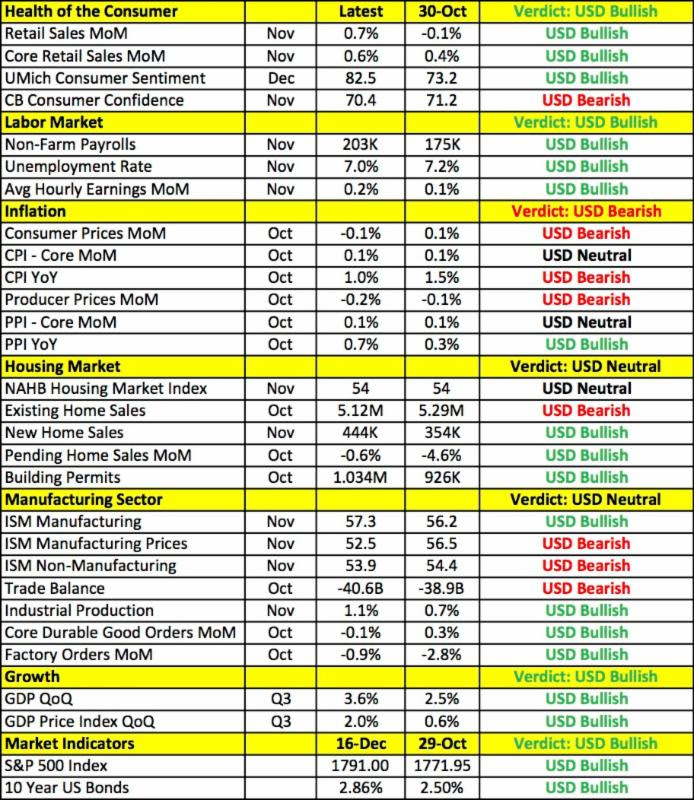How has the US Economy Changed Since Oct. FOMC Meeting?
The rally in U.S. stocks and sell-off in the dollar indicates that investors are getting excited about this week's FOMC announcement. Based on this morning's price action and mixed U.S. economic reports, traders are paring their expectations for Fed tapering. Our base case scenario is for a small amount of tapering this month ($5 to $10 billion) followed by a noncommittal outlook for further reductions that would minimize the market's reaction and give Janet Yellen the flexibility to design her own strategy for unwinding stimulus. Yet the decision will be a very close one with a reasonable number of economists looking for the Fed to taper in January or even March.
For the Federal Reserve, the greatest motivation for December tapering is the strength of U.S. data. While the Empire State manufacturing index fell short of expectations, manufacturing activity turned positive in the NY region this month. Industrial production also grew at its fastest pace in a year in November while nonfarm productivity rose 3% in the third quarter, the strongest pace of growth since September 2009. Since the last FOMC meeting, we have seen a significant recovery in consumer spending and the labor market but there are still pockets of weakness in other parts of the economy.
Putting ourselves into shoes of the central bank, we have compiled a table illustrating how economic data changed since the last FOMC announcement on October 30th. Nonfarm payrolls have averaged 204k over the past 4 months and this strength drove the unemployment rate down to 7%. Retail sales also rebounded in November after contracting in September and according to the latest consumer sentiment survey, Americans are feeling more optimistic. Considering that it is only a matter of time before the Fed starts reducing its monthly bond buys, it may be strategically sensible to begin tapering this month so they can spread the reductions over a longer period of time. However as indicated in the table below, inflation remains very low, giving policymakers the option to wait because inflation is not a major risk. The housing market has also been mixed but more importantly, stronger manufacturing activity is offset by slower growth in the service sector. U.S. yields have increased significantly over the past 7 weeks and by tapering, the central bank risks driving 10-year yields to 3%. As you can see, strong arguments can be made for tapering in December or January, which is why this month's FOMC announcement could trigger unusually large volatility in currencies.

When it comes to monetary policy actions, it is important to remember that the announcement doesn't have to be black or white or in policymaking terms hawkish or dovish. One of the great things about monetary policy decisions is that forward guidance can be just as useful in setting market expectations as the change in policy. Bernanke will hold a press conference following this week's meeting that will be just as important as the FOMC announcement itself. The Fed can taper and manage down expectations or forgo a reduction but set expectations for a move in January.
Kathy Lien, Managing Director of FX Strategy for BK Asset Management.
